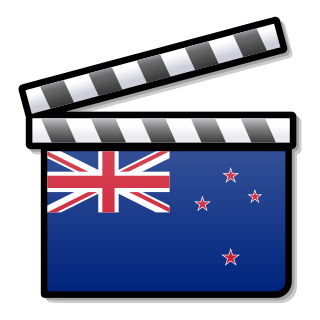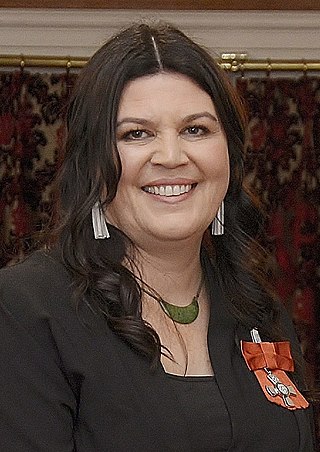Related Research Articles

New Zealand cinema can refer to films made by New Zealand-based production companies in New Zealand. However, it may also refer to films made about New Zealand by filmmakers from other countries. Due to the comparatively small size of its film industry, New Zealand produces many films that are co-financed by overseas companies.

The New Zealand Film Commission is a New Zealand government agency formed to assist with creating and promoting New Zealand films. It was established under the New Zealand Film Commission Act 1978.

Nikola Jean Caro is a New Zealand film, television, and music video director and screenwriter. Her 2002 film Whale Rider was critically praised and won a number of awards at international film festivals. She directed the 2020 live action version of Disney's Mulan, making her the second female and the second New Zealand director hired by Disney to direct a film budgeted at over $100 million. Caro's works ranged from music videos, commercials, television dramas, and films, etc.
The Big Mountain Short Film Festival is a short film festival based in Ohakune, New Zealand designed to encourage and celebrate creative short film making and storytelling. Entry is free and open to filmmakers internationally, who are encouraged to use maximum creativity on minimum budget. In addition to screening short films, the festival also features professional guest speakers offering tips and techniques on an assortment of topics of particular interest to low and no-budget filmmakers.
The New Zealand Writers Guild (NZWG) is a New Zealand trade union which represents writers in the fields of film, television, radio, theatre, video and multi-media. The guild's name in Māori language is Puni Taatuhi o Aotearoa. It provides services, events, networks, lobbying, and legal advice to writers mostly in the film and television industry. The Guild is affiliated to three major union organisations, the New Zealand Council of Trade Unions, the International Affiliation of Writers Guilds and the Union Network International.

Peter Northe Wells was a New Zealand writer, filmmaker, and historian. He was mainly known for his fiction, but also explored his interest in gay and historical themes in a number of expressive drama and documentary films from the 1980s onwards.
Merata Mita was a New Zealand filmmaker, producer, and writer, and a key figure in the growth of the Māori screen industry.

Briar Grace-Smith is a screenwriter, director, actor, and short story writer from New Zealand. She has worked as an actor and writer with the Maori theatre cooperative Te Ohu Whakaari and Maori theatre company He Ara Hou. Early plays Don't Call Me Bro and Flat Out Brown, were first performed at the Taki Rua Theatre in Wellington in 1996. Waitapu, a play written by Grace-Smith, was devised by He Ara Hou and performed by the group on the Native Earth Performing Arts tour in Canada in 1996.
Katie Wolfe is an actor, film and stage director from New Zealand. She appeared in television series including Marlin Bay (1990s), Shortland Street, and Mercy Peak. Her screen directing work has won awards, including Redemption at the ImagineNative Film + Media Arts Festival and This Is Her at the Prague International Short Film Festival. Wolfe wrote and directed a stage play, The Haka Party Incident that was presented in 2023 in New Zealand.
Louis Sutherland is a New Zealand film, television and advertising director and actor. He is of Samoan and Scottish descent, and based in Wellington.
Mīria George is a New Zealand writer, producer and director of Māori and Cook Island descent. Best known for being the author of award-winning stage plays, George has also written radio, television and poetry, and was one of the film directors of the portmanteau film Vai. In November 2005, she won the Emerging Pacific Artist's Award at the Arts Pasifika Awards. Mīria George was the first Cook Islands artist to receive the Fulbright-Creative New Zealand Pacific Writer's Residency at the University of Hawai'i.

Shirley Yeta Horrocks is a New Zealand documentary filmmaker, specialising in social and art topics. She was appointed an Officer of the New Zealand Order of Merit, for services to documentary filmmaking, in the 2019 New Year Honours. The citation notes that "Horrocks is a leader in documentary films on the arts in New Zealand and has directed and produced documentaries for 35 years".

Ainsley Amohaere Gardiner is a film producer from New Zealand.
Vanessa Rare is a New Zealand film and television actress, screenwriter and director. She is of Ngāti Pu, Ngāti Porou, Ngāti Pukenga and Ngāpuhi iwi descent.

Jackie van Beek is a New Zealand film and television director, writer and actress.
Renae Maihi is a New Zealand film director and screenwriter. She is best known for her work on the films Waru and We Are Still Here, both of which premiered at the Toronto International Film Festival in 2017 and 2022 respectively.
Patu! is a 1983 New Zealand documentary film directed by Merata Mita about the controversial 1981 Springbok tour. It follows the inner workings of the campaign against the tour, and captures scenes of violent conflict between police and protesters. It is a significant work of activist and indigenous filmmaking, and of New Zealand filmmaking in general.

Hamish Bennett is a New Zealand filmmaker born in 1978. He is best known for writing and directing the critically acclaimed film Bellbird (2019). His second film Uproar was released in 2023.
Caterina Maria De Nave was a New Zealand television and film producer, director, and media executive. She was the first woman to head a department at Television New Zealand (TVNZ) and one of the creators of New Zealand's longest-running soap, Shortland Street.
References
- 1 2 "Jess Charlton". NZOnScreen. Retrieved 17 August 2023.
- 1 2 "Jess Charlton: Cinematographer: Overview". NZonScreen. Retrieved 19 August 2023.
- ↑ Wood, Stacey (13 November 2010). "Film school marks 10 years of turning out young talent". The Dominion Post. p. A13. Retrieved 9 May 2024.
- ↑ "Jess Charlton: Awards". NZOnScreen. Retrieved 17 August 2023.
- 1 2 3 4 5 6 7 "It's the End of the World at the Wellington Film Festival". Scoop.co.nz. 11 July 2012. Retrieved 18 August 2023.
- ↑ Partridge, James (4 September 2012). "WELLINGTON FILM 'EXISTENCE' A BIG WINNER AT THE 2012 SCRIPT WRITERS AWARDS NEW ZEALAND". AdmitOne.co.nz. Retrieved 19 August 2023.
- ↑ "Existence". NZonScreen. Retrieved 18 August 2023.
- 1 2 Fox, Michael (2 November 2010). "Makara to become stage for post-apocalyptic Western". The Dominion Post. p. A4. Retrieved 9 May 2024.
- 1 2 3 4 "On the Escalator: An Update". WIFTNZ. 15 June 2011. Retrieved 19 August 2023.
- 1 2 "Existence". nzfilm.co.nz. Retrieved 19 August 2023.
- ↑ George, Sandy (6 April 2011). "NZFC invites 12 teams for low-budget Escalator initiative". Screendaily.com. Retrieved 19 August 2023.
- ↑ "Flip". nzfilm.co.nz. Retrieved 10 August 2023.
- ↑ "LOIMATA, The Sweetest Tears". NZ On Screen. Retrieved 9 May 2024.